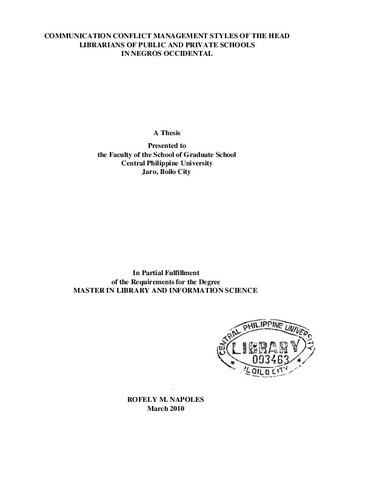| dc.description.abstract | This study aimed to determine the communication conflict management styles of the head librarians which may be dependent upon their existing levels of communication as also in turn could be affected by the personal characteristics of the head librarians. Additionally, comparison was also made on how the head librarians rated their styles of conflict management and their levels of communication and how their subordinates rated them on it.
Basically, being a descriptive-relational research, it used the one-shot survey design via a questionnaire patterned after a popular instrument the Organizational Communication Conflict Instrument (OCCI) developed by Dr. Linda L. Putnam, with some adaptations made for local perception’s sake. Official permission was sought for this purpose.
More specifically this study proceeded to: draw profile of the head librarians in terms of their age, civil status, educational attainment and length of service; find out the head librarians’ level of communication and whether it varied when rated by themselves and by their subordinates.; determine the head librarians’ communication conflict management style and whether their assessment differed with those of their subordinates; find out whether the head librarians’ level of communication differed in terms of their age, civil status, educational attainment and length of service; determine whether the head librarians’ communication conflict management style differed in terms of their age, civil status, educational attainment and length of service.; and ascertain whether the head librarians’ level of communication was significantly related with their communication conflict management style.
This study was conducted in the selected 20 private schools and public schools in Negros Occidental. There were 6 public schools and 14 private schools included in this study involving 20 head librarians and 84 subordinates.
Major Findings and Conclusions
1. Majority (70 percent) of the head librarians were married, likewise more than one half (60 percent) were employed as head librarians for more than 6 years, and as to age, of the 20 head librarians, one half (50 percent) were 40 years old and below and another one half (50 percent) were 41 years and above. For their educational attainment, almost one third (35 percent) of head librarians were master’s degree holders and the same number were bachelor’s degree holders with earned units in master program.
2. The head librarians when they were rated by themselves and by their subordinates on their levels of communication, showed dissimilar result but tended toward the more positive aspects of behaviours manifested. They both rated their levels of communication as very high on the phatic level and gut level.
3. Regarding the communication conflict management styles of the head librarians as assessed by themselves and by their subordinates, findings revealed that the non-confrontation style was rated by both parties as highest and as the dominant style used by the head librarians.
4. As to whether the personal characteristics of the head librarians is related to their levels of communication, findings revealed that there was no significant relationship between the age and levels of communication; as to their civil status, there was a slight relationships to the level of communication; but there was a high relationship between the educational attainment and the levels of communication; and as to their length of service, there was only a slight relationship.
5. As to whether the head librarians’ personal characteristics were related with their communication conflict management styles, result indicated that there was a negative association between the age and the communication conflict management styles; there was a moderately high relationship in their civil status; as to their educational attainment, there was a negative relationship; and as to their length of service, a negative relationship was found out.
6. In general, the relationships between the head librarians’ personal characteristics and their communication conflict management styles had a negative to low association. This implies that head librarians’ levels of communication have a little effect on their use of communication conflict management styles.
Recommendations
Considering that communication is one of the prevalent areas of conflict in an organization, head librarians must be aware of the strategies, techniques or approaches in managing conflict. Styles in managing conflict differ in every situation and that there is no one best way or style in resolving conflict. Open communication, honest and sincere relationship with one another can help ease and minimize conflict and misunderstanding with one another. For the head librarians, they must take into consideration the ratings of their subordinates especially in the giving of praises for the job well done by their subordinates.
By reflecting on the results and conclusions, the researcher has the following recommendations:
1. Head librarians could improve the levels of communication established between them and their subordinates. They could be more open to the suggestions, comments and ideas shared by their subordinates. For both, it would be delightful to have an open and honest communication, where everyone is comfortable to talk with each other.
2. To manage a group is a crucial responsibility of a leader. Hence, younger head librarians are not much well rounded when it comes to management skills, they could attend seminars on management and human relations to enhance their communication skills, particularly in managing conflict since this is a very delicate and complicated task for a leader. By reflecting on the strategies in managing conflict, it could be effective if head librarians could use often the solution-orientation instead of non-confrontation and control strategies.
3. It is recommended that head librarians could attend group dynamics and interpersonal communication seminars as the need for such has been revealed by this study. It is pertinent that good communication skills be possessed by the head librarians because of the nature of their work which often involves handling conflict situations among staff and clients.
4. For the future researcher who wishes to undertake research on this subject, it is recommended that the scope be widened and as possible include more librarians to give more justification on the findings revealed in this study. | en_US |


